提高d-木糖酸脱水酶活性以提高d-木糖生产d-1,2,4-丁三醇的酶和辅助因子工程
IF 4.4
2区 生物学
Q1 BIOTECHNOLOGY & APPLIED MICROBIOLOGY
引用次数: 0
摘要
d-1,2,4-丁三醇(BTO)是一种C4平台化合物,广泛应用于军事、医药等领域。从木质纤维素衍生的d-木糖生物合成d-1,2,4- bto是一条很有前途的生产途径。然而,d-木酸酯脱水酶催化活性低导致d-木酸的积累仍然是制约d-1,2,4- bto高效生产的关键瓶颈。在本研究中,我们旨在通过整合酶和辅因子工程的方法来提高d-木酸盐脱水酶的催化活性。首先,我们通过随机诱变和定点饱和诱变进化出d-xylonate脱水酶YjhG。在生成的变异中,YjhGT325F的d-木糖酸消耗比野生型酶增加了1.82倍。将该变异体引入生产菌株后,d-1,2,4- bto的产量比原菌株提高了1.34倍。通过对铁-硫[Fe-S]簇合成体系进行修饰,进一步增强了d-木酸盐脱水酶活性。我们系统地评估了三种[Fe-S]组装系统,包括SUF(由sufABCDSE编码)、ISC(由iscSUA-hscBA-fdx编码)和CSD(由csdAE编码)。对比分析表明,过表达SUF系统对YjhG的催化效率最高。重组菌株BT-YjhGT325F-SUF从d-木糖中提取了10.36 g/L的d-1,2,4- bto,摩尔产率为73.6%,是原菌株的1.88倍。该研究为通过酶和辅因子工程高效生产d-1,2,4- bto提供了坚实的基础。本文章由计算机程序翻译,如有差异,请以英文原文为准。
Enzyme and cofactor engineering to increase d-xylonate dehydratase activity for improved d-1,2,4-butanetriol production from d-xylose
d-1,2,4-Butanetriol (BTO), a C4 platform compound, is widely used in fields such as military and pharmaceuticals. Biosynthesis of d-1,2,4-BTO from lignocellulose-derived d-xylose presents a promising production route. However, the low catalytic activity of d-xylonate dehydratase leading to the accumulation of d-xylonic acid remains a key bottleneck for the efficient production of d-1,2,4-BTO. In this study, we aimed to enhance the catalytic activity of d-xylonate dehydratase through an integrated enzyme and cofactor engineering approach. Firstly, we evolved the d-xylonate dehydratase YjhG by using both random mutagenesis and site-directed saturation mutagenesis. Among the generated variants, YjhGT325F showed an 1.82-fold increase in d-xylonic acid consumption compared to the wild-type enzyme. When introduced into the producing strain, this variant increased d-1,2,4-BTO production by 1.34-fold compared to the original strain. Further enhancement was achieved by modifying the iron-sulfur [Fe–S] cluster synthesis system, which was critical for d-xylonate dehydratase activity. We systematically evaluated three [Fe–S] assembly systems, including SUF (encoded by sufABCDSE), ISC (encoded by iscSUA-hscBA-fdx), and CSD (encoded by csdAE). Comparative analysis revealed that the overexpression of SUF system conferred the highest catalytic efficiency of YjhG. The recombinant strain of BT-YjhGT325F-SUF produced 10.36 g/L of d-1,2,4-BTO from d-xylose, achieving a molar yield of 73.6 %, which was 1.88-fold that of the original strain. This study provided a robust foundation for high-efficiency d-1,2,4-BTO production through enzyme and cofactor engineering.
求助全文
通过发布文献求助,成功后即可免费获取论文全文。
去求助
来源期刊

Synthetic and Systems Biotechnology
BIOTECHNOLOGY & APPLIED MICROBIOLOGY-
CiteScore
6.90
自引率
12.50%
发文量
90
审稿时长
67 days
期刊介绍:
Synthetic and Systems Biotechnology aims to promote the communication of original research in synthetic and systems biology, with strong emphasis on applications towards biotechnology. This journal is a quarterly peer-reviewed journal led by Editor-in-Chief Lixin Zhang. The journal publishes high-quality research; focusing on integrative approaches to enable the understanding and design of biological systems, and research to develop the application of systems and synthetic biology to natural systems. This journal will publish Articles, Short notes, Methods, Mini Reviews, Commentary and Conference reviews.
 求助内容:
求助内容: 应助结果提醒方式:
应助结果提醒方式:


